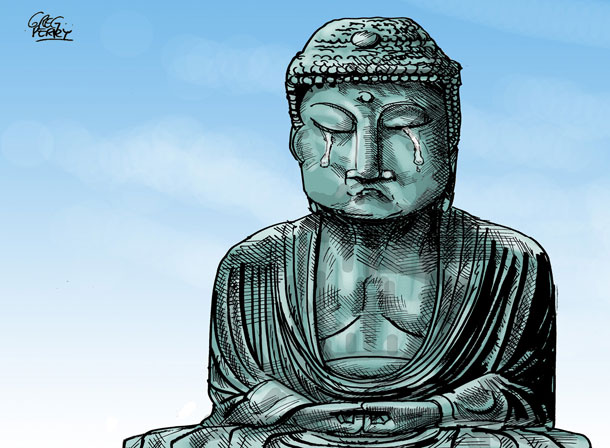It's almost cherry blossom time in Japan. The annual flowering of sakura is a much-anticipated season -- Japanese postcards and brochures are so sakura-heavy that a newcomer might think the pink flowers bloom all year round. It's not just the photographers who wait for sakura to reappear. The sudden explosion of pink is the signal for a nation-wide bacchanal, a series of parties called hanami. Hanami are outdoor picnics where friends and co-workers spread blankets beneath flowering cherry trees, unpack a vast array of snacks and home-made delicacies, and proceed to get rip-roaring drunk, presumably in solemn tribute to the beauty of nature.
This year? Perhaps not the time for Japan to celebrate nature. She who makes the tiny flowers bloom moves earth and sea to destroy lives and sweep away homes like so many petals. Will Japanese people still feel comfortable about putting on their cherished national open-air celebration? Scheduled Japanese events such as Fashion Week have been cancelled, and it would not be surprising if the national mood militates against light-hearted abandon. The trees will still bloom but for some their beauty might seem mocking, like coloured balloons at a funeral. "In Tokyo, everyone worries about radioactivity in the air," writes my friend Miwako. "So no one wants to do a hanami next month. Many people are leaving Tokyo right now."
Laughter in the park
I was invited to a hanami once. It was held in a beautiful park near Denenchofu, an hour from Tokyo. There were about a dozen of us, parked on a blue tarp laden with food -- gyoza, dried squid, deep-fried chicken nuggets, kimchi, chicken wings, Pringle's potato chips, yam fries, salad rolls, sushi rolls, shrimp noodle salad, pistachios, honey-roasted peanuts, Japanese pickles, and corn dogs, miniature ones on wooden sticks.
Also beer. But it was going fast. Some of the drinking was mandated, although there was plenty of enthusiastic volunteerism too. The forced drinking was connected to mass games of rock-paper-scissors, which is done a little differently in Japan. It involves a six-beat opening chant that goes: "Saisyoha guu; Jyanken pon!" Roughly translated it means, "First the stone; now let's go!" On the sixth beat the weapon of choice is revealed in the usual way, rock beats scissors, scissors cuts paper, paper covers rock. But this version of the game is a group activity. Six or seven people line up on each side with one person as a sort of referee to decide who wins and who loses. Losers then play again until finally only two are left. The ultimate loser is then commanded to shotgun a beer.
The problem was, I don't drink. So when I inevitably lost a game -- possibly via rigged officiating, though I could prove nothing -- it required a huddle to decide my fate. Decision reached, a paper plate was thrust in my direction. I was sentenced to roam the park, begging for food from other groups of picnickers.
It was a daunting prospect. Welcoming and polite though the Japanese are, a mistrust of foreigners remains common, fanned by media and politicians alike. The governor of Tokyo once said that, following a major earthquake, the first task of Tokyo police would be to round up foreigners in order to prevent riots and crime.
Now I was tasked with advancing upon strangers, thrusting out my plate with grunted demands. Actually the situation held possibilities -- with any luck the terrified locals might toss me their wallets and jewelry.
The group I approached did indeed look upon me with some alarm. "Sumi-masen," I pleaded, holding out the little plate. Blank looks and concerned glances ensued. Then they heard the cheering. My companions had gathered at the edge of their tarp to urge me on. The light dawned -- this gai-jin was being hazed. Smiles broke out, and suddenly food was piled on my little plate -- cake, potato chips, edamame. I returned a conquering hero. And there was much drinking.
Mourning and hope
Is this the year for such antics? Not for me to say. But I hope so. I hope Japanese people still gather under the cherry trees for their annual rite -- a little more subdued perhaps. But events like the great quake and tsunami have demonstrated once again the unity of Japanese society. National joys are part of that, along with national sorrows. So people of Japan, raise a toast to the beauty and terror of nature. And to yourselves. It is well deserved. ![]()

















Tyee Commenting Guidelines
Comments that violate guidelines risk being deleted, and violations may result in a temporary or permanent user ban. Maintain the spirit of good conversation to stay in the discussion.
*Please note The Tyee is not a forum for spreading misinformation about COVID-19, denying its existence or minimizing its risk to public health.
Do:
Do not: